Kae Cheatham's Blog: Whoa! Another Author?, page 13
May 10, 2011
Daughter of the Stone - 2
Available for Nook and Kindle.Overview:
Dwinn Somuron is reaching an age where she must be married and produce children, or she will be sent to the syndic's brothels. In this feudal society, women are chattel, breeders, throw-aways. Dwinn doesn't intend to live this life. She has already made plans to escape the strange land in which her people live: Get out and go to "beyond" a place of legend, but which she is certain will offer a better life.
But her plans are stymied after she is confronted by Lusaar Gursenni, the son of the head official of the land. His enemies want to dispose of him and his reformist parent ruler. Lusaar resists and becomes a hunted man; he has turned to Dwinn for assistance. Together, they battle mutual enemies and harsh environmental conditions while trying to reach their goals.~ from Chapter 8 ~
"First of all, you have to trust what you imagine."
"There's so much! How in all darkness—"
"Some images will spark an emotional response. We'll start with something easy. Imagine your father as a young man, perhaps when he first meets Chabris…Lusaar…What are you seeing?"
"Nothing. It's—it's jumbled. I can't make sense of it." He rubbed his hands over his face in aggravation.
"You're going to have to get over your fear before you can accomplish anything."
"You make it sound like I don't want to do this." Anger bubbled behind his words.
"I know you do. But a subconscious fear of failing often inhibits older people."
"Older? Cyclones, I'm only twenty-five!"
"Quiet down," Dwinn whispered, fearing Krandil would hear them. "You haven't been doing this since you were four, like some people. Now. You're building a story—an actual event. Try it again. Your father is a young apprentice. You are your father first meeting Chabris. And what happens?"
Dwinn leafed through Alyain's book hoping to find an exercise that would allow Lusaar to grasp the concept.
"I see a street in Rendef City...near the guild…it's...a game." He slumped back. "This isn't working."
Dwinn nodded agreement. This was the end of the second wake time since Krandil had burst in on them, and Lusaar still wasn't able to get more than a glimmering of his immediate genitors' past.
"How many people believe in Collateral Talent, anyway?" Lusaar asked.
Dwinn shrugged, disgruntled. "Uncle Vinsen was the only healer I'd heard of who promoted the theory. Families from Gryland and Daidrun came to him for advice. Of course, other healers might have hidden their belief, but I doubt it. He met with people from as far away as Wejan," Dwinn told, remembering the various visits. "Lots of female lines teach their children."
"Of course," he said.
Dwinn touched his thoughts, relieved to find no sarcasm.
"You're doing it now," Lusaar said sharply. "Reading me."
Dwinn sighed and nodded, wishing he could learn to build as quickly as he was recognizing her scan of his thoughts.
Lusaar laid back on the mattress they shared, a quiet depression about him. Dwinn felt his mind pressing in on hers, searching for the proper sensory mode to make contact with her. Dwinn kept her thoughts moving like a mental vortex. At the center, her concentration was on the book she examined, while a current of personal memories flowed around it. Soon Lusaar ceased his attempt to reach her and Dwinn heard his slow, relaxed breathing. He was asleep. Just as well, she thought. It was long after two bells. Krandil had insisted Lusaar do tronics work and, after this sleep, was sending him along the coast to Sabernam to purchase a vat of strebbec. No draymen assigned to him; he was to pull it back to Coantra on his own. Lusaar complied only to mollify Krandil, and Dwinn assumed Lusaar would use the opportunity, work withstanding, to solicit more backers. "And don't speak to anyone about politics," Krandil had fussed. "I don't want my station connected with any anarchy."
Krandil's pessimism worried Dwinn and she hoped to increase Lusaar's self-confidence before his father's attitude undermined the invigorating faith the Lalanns imbued. Lusaar still had doubts about his abilities. She studied the lesson before her, which discussed delving beneath imagination. She marked that place, deciding to get some rest. They wouldn't have any time together until late the next wake time when he got back from Sabernam.
She has tied cords to the waists of the two children for whom she's responsible. They can't hold hands anymore while negotiating the narrow decline along this terrible precipice. The boy, only four, keeps grabbing at her clothes, while the six-year-old girl has been closing her eyes; she must tell her to watch the slim path they follow even though they don't know where it leads. She shivers, both from fear and from the chill of this damp, rock world. Water has turned solid and slick. She can no longer hear the storms tearing at the ship. Her entire life has been in that ship, and she longs for the smooth, pale walls and constant temperature. Ahead and out of sight, she knows Brenard carries a light, following the men who follow Rendef Vadlin. When she thinks about Brenard, their thoughts meet. She can feel him smile.
From behind her, someone screams, and her thoughts go immediately to her family. She grasps her charges as her family silently communicates their safety. I don't want to fall. No! Why are we going to this terrible place; is there really something good here? Some hope? Brenard is attune to her while other voices and minds call out their fright, but that doesn't drown out the long piercing cry that fades down into the chasm, marking another death.
Dwinn struggled to breathe and came suddenly awake, seeing the mat walls of Lusaar's room. Perspiration glossed her brow and she reviewed the dream/memory. She calmed her breathing and shifted on the bedding, looking at Lusaar who slept at her side.
I have to get him to know himself, she thought, turning restlessly. I don't care if he builds stories from Chabris or Illin, or even from Terrick the Terrible, just so long as he tells me what he holds from old Rendef.
Dwinn knew if she were going to Beyond from the wall behind the palace, she needed more information than the terrifying imprint she had just experienced. Any recall about the descent from the ship she had, or had heard of, was a clutch of fear and remorse from the children. Eight times as many children as adults came under, because many of their parents, like Brenard's, had gone down the incredible escarpment to the land below the ship. They had disappeared in Beyond.
And they survived, Dwinn thought strongly. There are Korrestairs and Powns, Jethons and others living out there even now.
The idea cheered her. She wouldn't be totally alone in the Beyond.
May 9, 2011
Lethal Lineage – Review
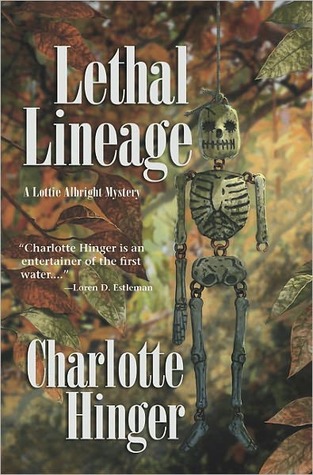
I really enjoy Charlotte Hinger's Lottie Albright mysteries. I'm fortunate to own both of them. I like the contemporary Western Kansas setting with wide open spaces and third/fourth generation land survivors. Thirty-something Lottie Albright is married to a respected rancher-veterinarian; she is a mover and shaker in the local historical society, and also the under-deputy sheriff for the county.
Lethal Lineage starts in church with Lottie, and members from several counties, attending the first service at the new church they built themselves. But the day is marred when Episcopal priest Mary Farnsworth has a panic attack, locks herself in another room, and is there found dead after the service. No windows, only one door. A natural physical ailment is ruled out.
The mystery deepens when there is no record anywhere of Mary Farnsworth's history, family, or other relations. And then there's the strange Bishop who was officiating for the baptism of Lottie's niece...He reminds Lottie of a priest she researched who lived 150 years ago.
A lot to contemplate here, and with Hinger's good writing the lively plot moves along quickly. We see her conflicts with being a sheriff and also a wife and a working historian; to lessen her burdens, her husband takes on the vacant deputy position, and is also on the case. Both of them really rile the sheriff of a neighboring county and he makes trouble.
Throw into this mix Lottie's continuing interviews with county people for family history, and, lo!, some seem to be tangential to the Farnsworth murder. Also, Lottie's very urban twin sister, Josie, gets involved after a not-so-smart arrest by the neighboring county sheriff. And then there's the fiddle contest...
Sound complex? Well it is, and I think Hinger nearly undid herself. The information that led to the denouement, while it tied up all the loose ends of the story, is presented quite late and it seemed a scramble to get it all told. And then there's Edna... Well, you know how it is with some characters: you either love 'em or you hate 'em...
All in all, Lethal Lineage is an interesting whodunit with complex characters and descriptive writing. I look forward to the next Lottie Albright adventure.
May 7, 2011
Heat Wave – Review
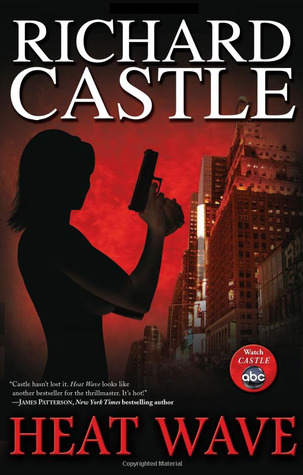
You know how the second season of a promising TV show is usually better than the first season? You saw the potential in that first season, but the timing was a bit off, or the lines seemed forced. Yet the characters were compelling enough that you kept watching, and tuned in for the next 13-week run.
Well, the Richard Castle books followed that pattern, which I guess is appropriate since Richard Castle is a TV character writing the fictionalized fiction of the real TV show, Castle. Lucky for me, I had read the second book, Naked Heat first, so when I was somewhat let down with book one Heat Wave I wasn't too undone. (The worst was the teensy-tiny print of the mass-market paperback I got on loan from my public library: 1/4 inch margins, for pity's sake!)
Heat Wave takes place during a heat wave in New York City when protagonist police detective Nikki Heat is called to investigate the death of a prominent mover-and-shaker in real estate. He has plunged six stories to his death from his huge suite/apartment into the beverage bar of the street café below. Suicide? Murder? Let Police Procedure begin! Interviews ensue with all of the deceased's associates, from his ditzy (or is she?) wife to low-lifes who might have a grudge. These characters are well presented and distinctive.
Being the first book of the series, introductions had to be made of Heat's detective assistants (they were too cutesy!) and her ME friend (the best character development), and, of course, the writer, Castle--er, Jameson Rook--who is a police tag-along while he researches a national article about the police department. Rook has none of the humorous charm of book two (or of Castle in the TV show); he seems rather Junior high-schoolish and vain; three cheers for improvements! The romantic and lustful interludes between Heat and Rook are more prominent in this first book and to me seemed a bit overdone. But then, I imagine this first book was an experiment (it almost seemed like a spoof) a whim of ABC directors, and they probably didn't expect it to become a NYT bestseller. If there's a third book, it will no doubt be better than the second.
Heat Wave is a fun read, and as vacation times approach, it's a good book to throw in the beach bag.
May 6, 2011
The Keeper of Lost Causes – Review
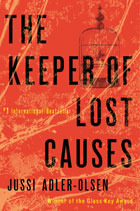
I was browsing Net Galley and really liked the sound of Jussi Adler-Olsen new mystery (expected release date, August 2011). Although the overview says that Copenhagen detective Carl MØrck is "deeply flawed" I didn't find him as such. He's a gritty, nose-to-the-grindstone cop who was recently nearly killed in an incident that took the life of one partner and severely injured another. MØrck questions himself as to whether he could have done something differently to avert the mayhem. No flaw there. In fact, this rough-and tumble- guy is really quite compassionate: he makes regular hospital visits to his debilitated colleague; his stepson (from a marriage gone bust but not officially over) lives with him; he even tolerates the odd requests that his I-don't-want-a-divorce wife puts on him.
But the recent near-death experience has put him into a deep funk. Unfortunately, he was never a favorite of some of the detective squad and his depressed, moody attitude makes him more of a thorn in their side. To get him out of their way, and to increase the main department budget, they put MØrck in charge of the newly-developed Department Q--a Cold Case department--expecting he will do nothing.
After sitting around contemplating the inside of his eyelids, he is motivated first by the economics involved in his "promotion" and second by his unique and highly-energetic new assistant. He soon finds himself following up on a five-year-old case of a politician gone missing. Was she murdered, kidnapped, victim of an accident, or did she commit suicide? The body of Merete Lynggaard was never found.
This is the first of a new series for Jussi Adler-Olsen and the presentation of the probable ongoing characters is nicely done. We learn enough to keep interest, but not so much that the background gets in the way of the story. In fact, with his assistant (ostensibly "maintenance man") there are a few mysteries hinted, which I'm sure will be revealed in forthcoming books.
As for the lost cause cold case that intrigues MØrck: it is deftly presented with separate chapters that deal with the victim from shortly before the time of her disappearance; with each Lynggaard chapter, you learn more about her and what might have happened. It's gripping down to the action-packed finale. In the last scene, The Keeper of Lost Causes is also touching with the emotions of MØrck, and all those involved.
Fine story. Fine writing (and translation).
May 5, 2011
Daughter of the Stone - excerpt 1
Available for Nook and Kindle.
~ Chapter 2 ~
Cups were again raised, with hurrahs all around. Dwinn, however, got a chill, and not just because of Bruy's possessive look. The entire event was too sudden, too forced. She turned away, seeking the man who had become the secondary figure in this celebration. He seemed to have vanished. The area was brighter now, because the town's portable frond lights had been carried in from the council grounds. The huge bulbs of gas sat at the perimeter of the area, with long translucent tubes towering up. The light they created flared over an array of steamed vegetables, trays of roasted pronghorn and smoked lizard. Various breads formed pyramids over tops of baskets. Girls hurried with platters of food to the clusters of men who laughed and talked in the bright light. Just to clearly see people's expressions, not have to squint to make out colors and textures, gave most people pleasure, but Dwinn felt no gaiety at all.
She pulled up her hunter's shorts that had a tendency to shift low on her hips, and pushed around people, searching the crowd for Vinsen. She finally glimpsed him in the dark of her shelter where he hastily removed items from a large valise and packed them into a sturdy old satchel. He laid several cloths in the bag and closed it, turning quickly when she reached him.
"Ah, Dwinn," he said, smiling. "I love a good festival, don't you?"
"I do not like this one," Dwinn said. "It's tainted, and I want to know why."
Alyain fingered the five-chamber herb pouch he wore on a shiny cord around his neck. Covered with iridescent scales, the swirl of colors formed the Alyain family crest. He looked beyond her to the crowd. Dwinn glanced there, too, seeing the three coastal men moving toward them. Alyain held up his hand for them to wait.
"Dwinn, I need to tell you why I've given up my station," he said to her.
"The singles law," she said angrily. "You've been ordered to move."
"With what I've recently perceived, that's very possible. But the original reason was to go to Rendef City. Chabris Vadlin has requested that I help her prove her rights to the dynast position through Collateral Talent."
Dwinn stepped back with shock. "You would help a dynast? Even this fem dynast? She's still a Vadlin!"
"Dynast Illin proclaimed Chabris as his successor in open court. Remember, Dwinn, she's been influencing law well since before Illin died."
"Her lowering of taxes hasn't gotten her any favor with the syndics," Dwinn grumbled. "She'll never win sanction."
Alyain drew Dwinn into her shelter, his hushed voice having an anxious sound. "She's the leader we need to turn this society around. Something must be done to keep her cousin from usurping power."
Dwinn shriveled inside, an icy knot threatening to consume her. The woman's cousin was Genn Wolkum, Commander of the Royal Guard who, twelve years ago, was responsible for the deaths of Dwinn's parents. Last year, Illin's funeral pyre was still smoldering when Genn Wolkum laid claim to the dynast position, stating his right because he was Illin's nephew, son of Illin's full sister. He had reminded the court that only male genes could hold and transfer talent. The Master Healer supported him, declaring that this transfer of talent would be with Wolkum even through a dormant female generation, such as Illin's sister.
"I felt compelled to help," Alyain stated. "Life has been much less repressive since Chabris has been in charge." He shoved the satchel he had just packed behind the pile of loose clothing at the head of Dwinn's bed.
"What's that?" she asked of the bag. She took off her knife belt and tossed it on her bed.
"Don't ask. Forget it's there. Hopefully I can reclaim it shortly. If not, it's yours to do with what you will."
Dwinn's pulse quickened, not liking his pessimistic tone, but she wouldn't try to glimpse his inner thoughts. It was simple to do with some people, but to knowingly make a read was considered impolite. Even if she had decided to read Vinsen, his advanced skills would easily block her.
"Well, how are you going to get to Rendef City?" she asked, worried over his plans.
"My escorts are already here...from Coantra," he said, moving back toward the festivities.
Dwinn studied the three men in coastal clothes as she followed. Coantra was on the coast. They must be the escorts, she thought. They were unarmed except for short segrenex knives, and she wondered how effective an escort they could be against the outlaws on the plains, or against the royal adversaries who might learn the reason for Vinsen's trek.
"Now you listen to me, Dwinn." Vinsen gripped her elbow. "It's time for you to alter your ways. You'll have to, you know."
"You expect me to accept Bruy's..." She clenched her fingers. "Hospitality? Is that why you named him to your station?"
"He's my oldest apprentice."
"He's too conservative," Dwinn snapped. "He thinks the appointment is more than that and so do I."
"He's inclined to pair with you. I've sensed his feelings, as you must have. You will need him."
Dwinn wished Aunt Betree were here; Aunt Betree had discouraged Bruy's interest as much as Dwinn ignored it. Privately Betree had told Dwinn, "You, especially, must find a man you can respect. Men and women hardly ever agree, but with respect, good things will grow." Dwinn certainly didn't respect Bruy, with his condescending manner and exacting ways.
"Be sensible, girl," Alyain went on. "Your breeding time is nearly over. Where will you be then, with no mate or child? You'll have no position at all. I can't bear to think of what Syndic Pown will force on you. You must breed!"
Dwinn pinched her lips together hating the thought of more children subjected to this hopeless existence. And what if she bore a girl? A pawn. A breeder with no rights and even less hope. That was the one positive thing about the fem dynast. Although Chabris was a Vadlin, the woman made her own decisions and was attempting to bring a different standard to the land.
"Here." Vinsen took the five-chamber pouch from around his neck. "This is yours, Dwinn, my—my only heir." The metal cord he placed in her hand signified his Priman position. His voice dropped to a whisper, "Hold to your beliefs no matter how you're forced to live. Bruy can't contain you, I know that; he probably won't even demand that you pair with him, and his adoration will allow you more freedom than you'd have with someone else."
"You act as if you aren't coming back!" she gasped.
He frowned. "Any aid given to the fem dynast could be dangerous, Dwinn. That's why I've made these preparations for the village, and for you."
His embrace nearly crushed her. She buried her head against his shoulder, acutely aware of the scent of soap, the smoky odor of his cape, and the hard strength of his arms around her. Dwinn squeezed closed her golden eyes, but the tears oozed through, large and hot as they trailed along her cheeks. She tried to blink them away, feeling vulnerable, as if she had shrunk and time had regressed to twelve years earlier when Vinsen Alyain had turned her from the shock of witnessing her parents' excruciating deaths. At that time Vinsen's gentle hands had pulled her face to his chest, his deep voice soothing, his mind talk communicating the event was over, to let go, time to start anew.
...Miss Timmins' School For Girls - Review

I requested the ARC for Miss Timmins School for Girls after reading the overview at Net Galley. Here's part of it:
"An intense, irreverent love story and a dark murder mystery, Miss Timmins' School for Girls is also a coming of age novel set at the confluence of three great cultures: the heroine's conservative, middle class Brahmin family, the British Colonial universe of the boarding school, and the rock 'n' roll, drugs, free love philosophy of the 1970s, filtered to this small corner of India...."
I was immediately drawn in by Nayana Currimbhoy's use of language and smooth writing. The 1974 setting in a small mountain town in India is unique and well drawn. Much of the story takes place during the monsoon season, and I could feel the perpetual dampness and visualize the land shrouded in mist and heavy squalls.
The fictional Miss Timmins' School for Girls is in this town--a British missionary boarding school--run much as it has been since the turn of the 20th Century. Well-to-do Indian families send their daughters here to learn English and western ways. Charu Apte goes there to teach, and it is her story that runs through the novel; her story and the secrets and attitudes of the boarding school. Not long after monsoon season begins, one of the English teachers is found dead at the bottom of a cliff. Police suspect murder. Charu was friends with the woman.
This is intriguing. This could be riveting, but for me, it was not. The story was too distended with character descriptions of even the most humble of the large cast of characters. Paragraphs and anecdotes, while nicely told, often diluted an emotional scene, and I often had to tab back several pages to recall the main thrust of a scene.
The story is told from three points of view, but each of them is written as first person. There's Merch, in the prologue, then Charu Apte, then one of the students, Nandita, then Apte again. Unfortunately, there was no variance in the tone and style of the first person writing. The Apte sections often were set up as her reminiscing on the events of 1974, yet the character doesn't give much emotional reflection on the occurrences. First person stories also succumb to the need to give information to which the main character isn't witness, so there is always someone telling and passing on information. Several times an incident would be told, and then retold, and then explained again in detail as the main character talked to different people. Letters and news articles seemed to be recited verbatim by the teller, especially in Nandita's section.
Most of the story is from Apte's point of view, and she is and interesting character; just the story of her family could have made a book in itself. Through Charu, the expectations of India's many social strata are shown, good and bad. Continual reference is made to a woman's role, the importance of marriage and how this determines a woman's place in the family. Her father has secrets, her mother becomes ill, her mother's family is at times exasperating and at others humorous. Some of the best scenes deal with Charu's family.
Yet, had I borrowed this book from my Public Library, I doubt I would have finished it. Too many passages went on too long, and I quickly realized many of them were unnecessary to the overall story. What kept me reading was knowing this was an ARC—actually and "Uncorrected e-Proof." I hope a sincere editor has worked to smooth this into a more contained story that will show off Nayana Currimbhoy's obvious talent.
Here is an interesting article that enhances some of the social ethics mentioned in Currimbhoy's book.
May 2, 2011
I See A Pattern

I'm continuing to update my book list at Goodreads. By tagging each title, I can see the pattern. More than half of the books I've completed are mysteries.
Maybe I should try branching out a bit? But then, I read for pleasure and entertainment, not for enforced mental enhancement. :)
Now if ALL the titles were mysteries...
May 1, 2011
E-book Special
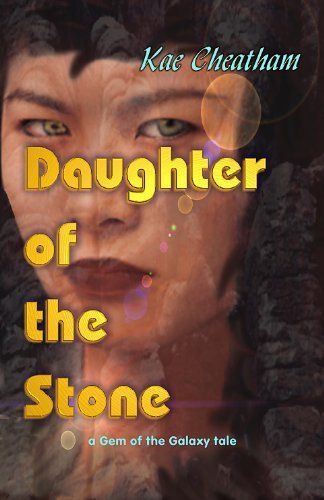
Daughter of the Stone, the first book in the Gem of the Galaxy series, is $.99 through 31 May. This is a luxury of e-book authors, to be able to offer the books in different ways and at different prices. What fun!
"...Daughter of the Stone is a compelling tale that is sure to delight Sci-Fi fans. The author has imbued this story with descriptions and narratives that make the world come alive...."
Read the full review at Fallen Angel Reviews.**
Overview:Download today: Kindle and Nook**If you read some reviews on line, they refer to the author as Arryn Heath; not to worry, that's me from the days when I thought I might use a pseudonym. The first print edition of Daughter of the Stone came out under that name. BIG mistake.Dwinn Somuron is reaching an age where she must be married and produce children, or she will be sent to the syndic's brothels. In this feudal society, women are chattel, breeders, throw-aways. Dwinn doesn't intend to live this life. She has already made plans to escape the strange land in which her people live: Get out and go to "beyond" a place of legend, but which she is certain will offer a better life.
But her plans are stymied after she is confronted by Lusaar Gursenni, the son of the head official of the land. His enemies want to dispose of him and his reformist parent ruler. Lusaar resists and becomes a hunted man; he has turned to Dwinn for assistance. Together, they battle mutual enemies and harsh environmental conditions while trying to reach their goals.
April 28, 2011
Business Update
Maintenance of this blog and writing reviews don't take up all my time. I also have a business, Get It Together Productions (GITP). Along with book production, GITP specializes in images of domestic animal events and rural activities. I maintain a blog for GITP, with a few writing tips and book industry news; and I'm currently updating the GITP Facebook page to include photos of various activities and events.
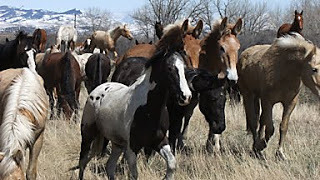
Please pay a visit to see interesting photography and notes. Recent pictures in the Domestic Animal Activities gallery include this one from last weekend's Montana Horse Roundup.
I hope to see your name on my FB "fan" list!
April 22, 2011
Just Another Day?

Do you remember what you were doing on Earth Day 1970? That was the first national gathering of the environmentally concerned. Some of you might have still been in diapers, or not yet born, so here's the official history.
I was at the University of Michigan in 1970, and that campus was/is renown for activism and protests. I don't recall the exact details, but I'm sure I was into doing something. Our American Indian group, American Indians Unlimited, took Earth Day quite seriously; I remember a bumper-sticker we all had on our cars: "America: Love It or Give it Back". I also worked at the School of Natural Resources for Dr. Richard Duke who was involved in building one of the first social and environmental computer simulations for city planners. (Think prototype for Sim City)
Earth Day was originally a U.S. phenomenon, but has spread to global recognition. Yet in the ensuing forty years it doesn't seem that much has happened on the "Love Earth" campaign. Along with the natural calamities striking areas around the world, the national economics of many countries have restricted Earth's management to isolated areas, and education--what the original Earth Day was all about--has more of a "preaching to the choir" aspect rather than effectively reaching the masses.
With Earth Day, are we merely keeping up appearances by adding yet another "special" day to the calendar? I will contemplate this as I make my once-a-week trip to town; I'll recycle my paper, tin, cardboard and glass while I'm there--something I do every month, not just once a year (Getting rid of plastic is a bimonthly event; our area population isn't large enough to have a full-time plastics recycle center). As usual, I'll have groceries packed in my reusable bags and check the air in my tires to get the maximum gas mileage from my efficient four-cylinder car.
Just another day.
Whoa! Another Author?
- Kae Cheatham's profile
- 24 followers



